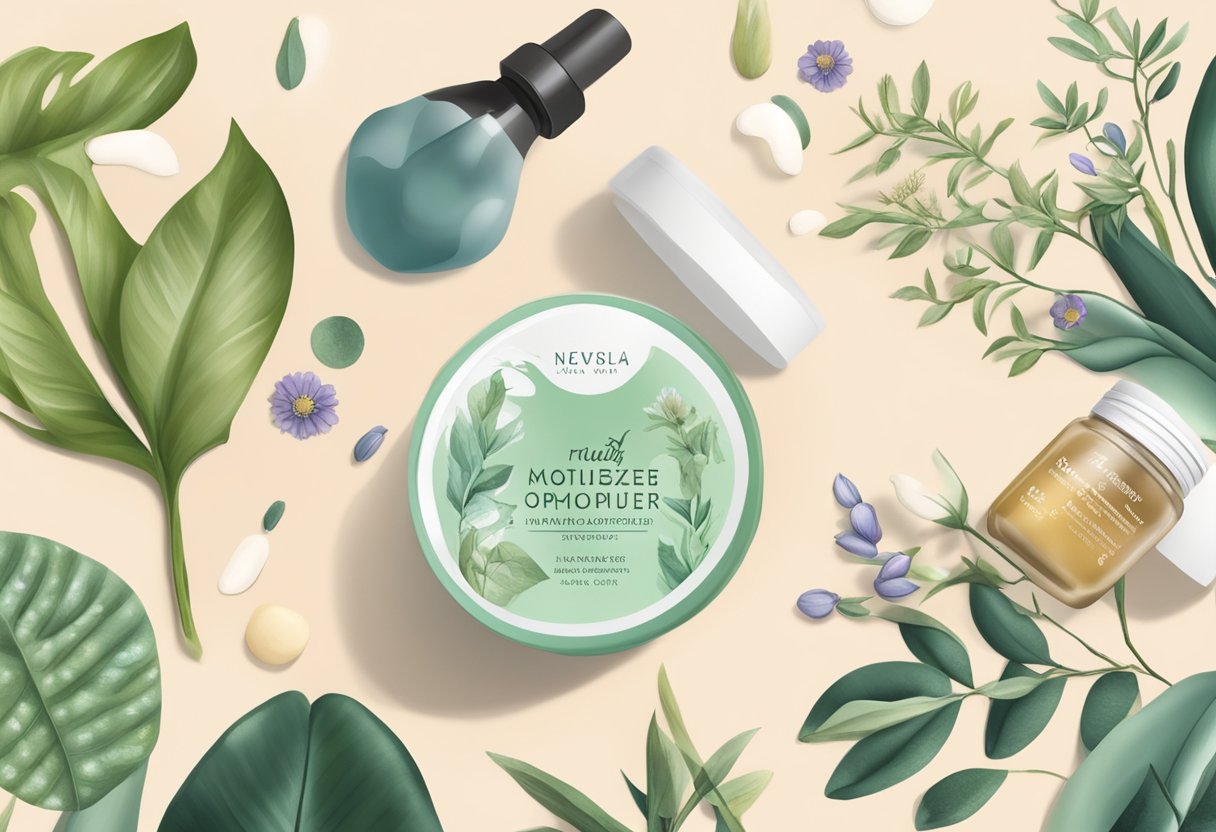Sensitive skin can be a challenge to take care of, especially when it comes to finding the right skincare products. Many people with sensitive skin struggle to find products that won’t cause irritation or breakouts. However, with a proper skincare routine and the use of natural products, it is possible to keep sensitive skin healthy and glowing.

One of the most important aspects of a skincare routine for sensitive skin is the use of natural products. Harsh chemicals and fragrances can cause irritation and inflammation, making sensitive skin even more sensitive. Natural products, on the other hand, are gentle and nourishing, providing the skin with the nutrients it needs to stay healthy and strong.
A 5-step skincare routine can be a great starting point for anyone with sensitive skin who wants to take better care of their skin. This routine includes cleansing, toning, exfoliating, moisturizing, and applying sunscreen. By following this routine and using natural products, people with sensitive skin can achieve a healthy, glowing complexion.
Understanding Sensitive Skin

Sensitive skin is a common skin condition that affects many people. It is characterized by skin that is easily irritated, inflamed, or itchy. People with sensitive skin can experience a range of symptoms, including redness, dryness, flakiness, and even acne.
Sensitive skin can be caused by a variety of factors, including genetics, environmental factors, and lifestyle choices. Some people are born with naturally sensitive skin, while others develop it over time due to exposure to harsh chemicals, pollution, or other irritants.
There are a few key things to keep in mind when caring for sensitive skin. First, it is important to avoid harsh chemicals and other irritants that can cause inflammation and irritation. This means avoiding products that contain fragrances, dyes, and other potentially irritating ingredients.
Second, it is important to choose products that are formulated specifically for sensitive skin. These products are designed to be gentle and non-irritating, and they often contain natural ingredients that can soothe and hydrate the skin.
Finally, it is important to establish a regular skincare routine that includes cleansing, moisturizing, and protecting the skin from the sun. This can help to keep the skin healthy and hydrated, and can also help to prevent further irritation and inflammation.
Overall, sensitive skin can be a frustrating and challenging condition to deal with, but with the right care and attention, it is possible to keep it under control and maintain healthy, beautiful skin.
Identifying Natural Products

When it comes to skincare products, natural ingredients are often preferred over synthetic ones. Natural products are derived from plants, minerals, and other natural sources, and are generally considered safe for sensitive skin. Here are some key benefits of natural skincare products and some common natural ingredients to look for when shopping.
Benefits of Natural Skincare
Natural skincare products are often preferred over synthetic ones because they are gentler on the skin. They contain fewer harsh chemicals and are less likely to cause irritation or allergic reactions. Natural products are also generally considered to be more environmentally friendly, as they are often biodegradable and less harmful to the planet.
Common Natural Ingredients
There are many natural ingredients commonly used in skincare products. Here are a few to look for:
- Aloe Vera: This plant extract is known for its soothing and healing properties. It can help calm irritated skin and reduce inflammation.
- Chamomile: Chamomile is another natural ingredient that can help soothe and calm the skin. It is often used in products designed for sensitive skin.
- Coconut Oil: Coconut oil is a natural moisturizer that can help hydrate and soften the skin. It is often used in products designed for dry or sensitive skin.
- Green Tea: Green tea is rich in antioxidants, which can help protect the skin from damage caused by free radicals. It is often used in products designed to reduce signs of aging.
- Jojoba Oil: Jojoba oil is a natural moisturizer that is similar in composition to the skin’s own sebum. It can help regulate oil production and prevent breakouts.
When shopping for natural skincare products, it’s important to read the ingredient list carefully. Look for products that contain natural ingredients and avoid those that contain harsh chemicals or synthetic fragrances. By using natural products, you can help keep your skin healthy and looking its best.
Step 1: Gentle Cleansing

Taking care of sensitive skin can be a challenge, but it is possible with the right skincare routine. The first step in any skincare routine is to cleanse the skin, but for sensitive skin, it is essential to choose a gentle cleanser that won’t irritate or strip the skin of its natural oils. In this section, we will discuss how to choose a cleanser and the proper techniques for cleansing sensitive skin.
Choosing a Cleanser
When selecting a cleanser for sensitive skin, it is essential to look for products that are free from harsh chemicals, fragrances, and other irritants. Natural and organic products are a good option as they are less likely to cause irritation. Some of the best natural ingredients for sensitive skin include aloe vera, chamomile, and green tea. These ingredients have soothing properties that help to calm the skin and reduce inflammation.
It is also important to avoid cleansers that are too harsh or abrasive, such as those that contain exfoliating beads or acids. These products can damage the skin’s protective barrier, making it more susceptible to irritation and inflammation.
Cleansing Techniques
When it comes to cleansing sensitive skin, the technique is just as important as the product. Here are some tips for cleansing sensitive skin:
- Use lukewarm water: Hot water can be too harsh for sensitive skin, so it’s best to use lukewarm water when cleansing.
- Be gentle: Avoid rubbing or scrubbing the skin too hard, as this can cause irritation and inflammation. Instead, use gentle, circular motions to massage the cleanser into the skin.
- Rinse thoroughly: Make sure to rinse the skin thoroughly with lukewarm water to remove all traces of the cleanser.
- Pat dry: After cleansing, pat the skin dry with a soft towel. Avoid rubbing the skin, as this can cause irritation.
By following these tips, you can cleanse your sensitive skin without causing irritation or inflammation. Remember to choose a gentle cleanser that is free from harsh chemicals and fragrances, and to use a gentle technique when cleansing the skin.
Step 2: Soothing Toning

After cleansing, the next step in a 5 step skincare routine for sensitive skin is toning. Toning helps to balance the skin’s pH levels and remove any remaining impurities. For those with sensitive skin, it’s important to select a toner that is gentle and soothing.
Selecting a Toner
When choosing a toner for sensitive skin, it’s important to look for natural ingredients that are gentle and non-irritating. Some popular natural toning ingredients include:
- Rosewater: This gentle toner helps to soothe and hydrate the skin.
- Witch Hazel: This natural astringent helps to tighten pores and reduce inflammation.
- Aloe Vera: This soothing ingredient helps to calm redness and irritation.
It’s also important to avoid toners that contain alcohol or other harsh ingredients that can strip the skin of its natural oils and cause irritation.
Application Tips
To apply toner, simply pour a small amount onto a cotton pad and gently swipe it over the face and neck. Avoid rubbing or pulling on the skin, as this can cause irritation.
For those with particularly sensitive skin, it may be best to skip the toner step altogether or use a toner only every other day.
Overall, a gentle, soothing toner can be a great addition to a 5 step skincare routine for sensitive skin. By selecting natural ingredients and using gentle application techniques, those with sensitive skin can achieve a healthy, balanced complexion.
Step 3: Hydrating with Serums

Serums are a great way to provide extra hydration to the skin, and they can be especially beneficial for those with sensitive skin. When choosing a serum, it’s important to look for ingredients that will soothe and nourish the skin without causing irritation.
Serum Ingredients for Sensitive Skin
There are a variety of ingredients that can be beneficial for sensitive skin, including:
- Hyaluronic acid: This ingredient is great for hydrating the skin without causing irritation. It works by attracting and retaining moisture in the skin, leaving it feeling plump and hydrated.
- Aloe vera: Aloe vera is known for its soothing and healing properties, making it a great option for those with sensitive skin. It can help to reduce inflammation and redness, and it’s also a great source of hydration.
- Vitamin E: Vitamin E is a powerful antioxidant that can help to protect the skin from damage caused by free radicals. It’s also great for hydrating the skin and can help to reduce inflammation.
- Chamomile: Chamomile is a natural anti-inflammatory that can help to soothe and calm the skin. It’s also great for reducing redness and irritation.
Applying Serums
When applying a serum, it’s important to start with clean, dry skin. Use a gentle cleanser to remove any dirt and oil from the skin before applying the serum.
Apply a small amount of serum to the face and neck, using gentle, upward strokes to massage it into the skin. Be sure to avoid the eye area, as some serums can be irritating to the delicate skin around the eyes.
Once the serum has been absorbed into the skin, follow up with a moisturizer to lock in the hydration. Using a serum in combination with a moisturizer can help to provide long-lasting hydration and keep the skin looking and feeling healthy.
Step 4: Moisturizing

Moisturizing is an essential step in any skincare routine, especially for people with sensitive skin. It helps to hydrate the skin and lock in moisture, preventing dryness and flakiness. In this section, we will discuss the different types of moisturizers and techniques for moisturizing sensitive skin.
Moisturizer Types
When it comes to choosing a moisturizer for sensitive skin, it is important to look for products that are gentle and free from harsh chemicals. Here are some types of moisturizers that are suitable for sensitive skin:
- Creams: Creams are thicker and more emollient than lotions, making them ideal for dry and sensitive skin. Look for creams that contain natural ingredients like aloe vera, chamomile, and calendula.
- Oils: Facial oils are a great option for people with sensitive skin as they are gentle and nourishing. Look for oils that are high in essential fatty acids like argan oil, jojoba oil, and rosehip oil.
- Serums: Serums are lightweight and fast-absorbing, making them ideal for sensitive skin. Look for serums that contain hyaluronic acid, niacinamide, and vitamin C.
Moisturizing Techniques
Moisturizing sensitive skin requires a gentle touch and careful attention to detail. Here are some techniques for moisturizing sensitive skin:
- Apply moisturizer to damp skin: Applying moisturizer to damp skin helps to lock in moisture and prevent evaporation. After cleansing, pat your face dry with a towel and apply moisturizer immediately.
- Use gentle pressure: When applying moisturizer, use gentle pressure and avoid rubbing or tugging at the skin. This can cause irritation and redness.
- Apply in upward motions: Applying moisturizer in upward motions helps to stimulate circulation and prevent sagging. Start at the neck and work your way up to the forehead.
By following these tips and using gentle, natural products, you can keep your sensitive skin moisturized and healthy.
Step 5: Protecting the Skin

When it comes to sensitive skin, protecting it from harmful UV rays and environmental pollutants is crucial. Here are some tips for protecting sensitive skin:
Choosing Sun Protection
One of the most important ways to protect sensitive skin is by using a broad-spectrum sunscreen with an SPF of at least 30. Look for a mineral-based sunscreen that contains zinc oxide or titanium dioxide, which are less likely to irritate sensitive skin.
It’s also important to apply sunscreen generously and reapply every two hours, especially if you’re spending time outdoors or swimming. Don’t forget to protect your lips with a lip balm that contains SPF.
Other Protective Measures
In addition to sunscreen, there are other protective measures you can take to keep your sensitive skin safe. Wearing a wide-brimmed hat and sunglasses can help shield your face and eyes from the sun’s harmful rays.
You can also protect your skin by avoiding the sun during peak hours, typically between 10 a.m. and 4 p.m. If you do need to be outside during these hours, seek shade under a tree or umbrella.
Finally, consider incorporating antioxidants into your skincare routine. Antioxidants like vitamin C and E can help protect your skin from free radicals and environmental stressors that can cause damage and irritation. Look for skincare products that contain these ingredients or incorporate antioxidant-rich foods into your diet.
Customizing Your Routine

When it comes to skincare routines, there is no one-size-fits-all approach. Each individual has unique skin that may react differently to various products. Therefore, it is important to customize your skincare routine to your specific needs. Here are some tips for customizing your routine for sensitive skin:
Adjusting for Skin Reactions
If you notice any adverse reactions to a product, such as redness, itching, or burning, it is important to stop using it immediately. It is also recommended to patch test new products before incorporating them into your routine. To patch test, apply a small amount of the product to a small area of skin and wait 24-48 hours to see if any reactions occur.
Additionally, if you have particularly sensitive skin, it may be helpful to avoid products with fragrances, dyes, and harsh chemicals. Instead, opt for natural products with simple ingredients.
Seasonal Considerations
As the seasons change, so should your skincare routine. During the colder months, the air tends to be drier, which can lead to dry and sensitive skin. To combat this, it may be helpful to incorporate a heavier moisturizer into your routine.
In the summer months, it is important to protect your skin from the sun’s harmful rays. Look for a sunscreen that is specifically formulated for sensitive skin. Additionally, if you spend a lot of time in the water, consider using a water-resistant sunscreen.
By customizing your skincare routine to your individual needs and seasonal changes, you can help keep your skin healthy and glowing.
Maintenance and Troubleshooting

Routine Maintenance Tips
Maintaining a skincare routine is essential to keep your skin healthy and glowing. Here are some tips to keep in mind:
- Stick to your routine: Consistency is key when it comes to skincare. Stick to your routine and give it time to work.
- Store products properly: Keep your skincare products in a cool, dry place away from direct sunlight to prevent them from spoiling.
- Check expiration dates: Skincare products have a limited shelf life. Check the expiration date on your products and discard them if they have expired.
- Use clean tools: Make sure to wash your hands and any tools you use, such as brushes or sponges, before applying skincare products to prevent the spread of bacteria.
Addressing Skin Sensitivities
Sensitive skin requires special attention, and it’s important to troubleshoot any issues that may arise. Here are some tips for addressing skin sensitivities:
- Patch test new products: Before incorporating a new product into your routine, patch test it on a small area of skin to make sure it doesn’t cause a reaction.
- Avoid harsh ingredients: Harsh ingredients such as alcohol, fragrances, and sulfates can irritate sensitive skin. Look for gentle, natural products instead.
- Keep it simple: A minimalistic skincare routine can be beneficial for sensitive skin. Stick to gentle cleansers, moisturizers, and sunscreen to avoid overwhelming your skin.
- Seek professional help: If you’re experiencing persistent skin sensitivities or reactions, it’s best to seek advice from a dermatologist. They can help you identify the root cause of the issue and provide personalized recommendations.
Frequently Asked Questions

What essential steps should be included in a daily skincare routine for sensitive skin?
A daily skincare routine for sensitive skin should include a gentle cleanser, toner, moisturizer, and sunscreen. It is important to avoid harsh chemicals, fragrances, and exfoliants that can irritate sensitive skin.
Which natural ingredients are most beneficial for sensitive skin care?
Natural ingredients that are beneficial for sensitive skin care include aloe vera, chamomile, green tea, and oatmeal. These ingredients have anti-inflammatory and soothing properties that can help calm and protect sensitive skin.
How can one adapt the Korean skincare method for sensitive skin?
One can adapt the Korean skincare method for sensitive skin by using gentle and natural products that are free from harsh chemicals and fragrances. It is also important to avoid over-exfoliating and to listen to your skin’s needs.
What are some affordable natural skincare products suitable for sensitive skin?
Affordable natural skincare products suitable for sensitive skin include Cetaphil Gentle Skin Cleanser, Thayers Witch Hazel Toner, and Burt’s Bees Sensitive Daily Moisturizing Cream. These products are gentle, effective, and affordable.
Can you create an effective nighttime skincare routine specifically for sensitive skin?
An effective nighttime skincare routine for sensitive skin should include a gentle cleanser, toner, and moisturizer. It is also important to use a gentle eye cream and to apply a facial oil or serum to help nourish and repair the skin while you sleep.

